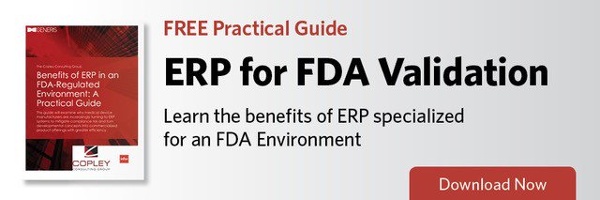In this special blog series, ERP Software & FDA Compliance, we’ll discuss the advantages of using an ERP system in an FDA-regulated industry. From organizing mission-critical documents to vendor management, you’ll learn how ERP helps keep product timelines in place and manufacturers in compliance.
It is not uncommon for manufacturers in FDA-regulated industries to utilize suppliers for components of their finished products.
 While these parts may not be produced on site, the burden of compliance – and, ultimately, product quality – rests with the company receiving the product or service. As such, the selection, approval and ongoing evaluation of suppliers is a heavily regulated and critical responsibility for manufacturers.
While these parts may not be produced on site, the burden of compliance – and, ultimately, product quality – rests with the company receiving the product or service. As such, the selection, approval and ongoing evaluation of suppliers is a heavily regulated and critical responsibility for manufacturers.
Here are three areas where an ERP system can support compliant supplier management.
Supplier Approval
Quality control largely depends upon your suppliers. That’s why rigorous supplier evaluation is a key element of the expectations laid out by the FDA in 21 CFR 820. Any entity not covered by your internal quality audit is considered to be a supplier. The FDA advises that your primary criteria in selecting a supplier be its “ability to meet specified requirements including quality requirements.” Here are some points to consider under that umbrella.
- Does the company have experience in your industry and/or with a similar product set?
- Does the supplier have the bandwidth to confidently manage your work?
- Have the supplier’s components been involved in any product failures or recalls?
- To support your compliance, it is critical that along with your list of approved suppliers, you document your vetting and approval process. This may include selection criteria, references, audits and performance evaluations – all of which can be securely stored in your ERP system.
Business Agreements
Your supplier contract is the roadmap for how you navigate your supplier relationship and the expectations associated with it. As such, your agreement should contain clauses related to your standards for delivery, quality and validation. The contract should also, per the FDA, request that the supplier notify you of changes in the product or service so you can determine whether the changes will affect the quality of a finished product. By managing your agreement within your ERP system, you can ensure all parties, including your accounting and inventory departments, are referencing the most recent contract. This also allows the user to easily reference related documentation, such as product- and supplier-specific quality plans, within the system.
Quality Requirements
Effective communication of your quality standards is essential to supplier management. Because quality standards vary from product to product, it is important to deliver and verify receipt of each new product and product variation’s specifications with your supplier. Whenever possible, record and/or store supplier transactions and correspondence as well, as these documented interactions support your compliance in case of an audit. Your ERP system can help you manage structured data and create workflows so quality and supplier management can work hand-in-hand across all product groups.

